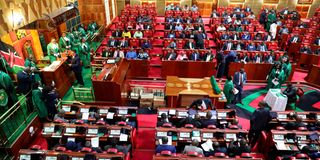MPs step-up push for special debt repayment fund

Parliament in a past session. The Parliamentary Committee on Public Debt and Privatisation has stepped a push for the creation of a sinking fund for loan repayment amid growing concerns that the country is headed to debt distress.
A Parliamentary committee has stepped a push for the creation of a sinking fund for loan repayment amid growing concerns that the country is headed to debt distress.
The Committee on Public Debt and Privatisation also want the Public Finance Management Act (PFM Act) amended to provide for the enactment of an Annual Loan Financing Bill to enable the National Assembly to review and approve the debt financing intended to finance the fiscal deficit of the annual budget.
“The National Treasury should within six months, table regulations for the establishment of a sinking fund dedicated to public debt servicing,” the Committee on Public Debt and Privatisation says in its report on Consolidated Fund Services (CFS) on the supplementary estimates I for the 2022/23 financial year, tabled in the National Assembly.
A sinking fund refers to money set aside for a specific purpose within a period. Governments mainly use them for debt payments to avoid piling pressure on other critical expenditures.
Kenya’s public debt has grown fast in the past decade amid the take up of loans to build mega infrastructural projects such as the standard gauge railway. The government has also incurred billions of shillings to build roads, set up energy projects, and expand sea and airports—pushing up the country’s debt level to Sh9.15 trillion as of December 31, 2022, which is an equivalent of about 67 per cent of the country’s gross domestic product (GDP).
The Public Debt and Privatisation committee chaired by Balambala MP Abdi Shurie, made the recommendations after a session with the National Treasury, the Parliamentary Budget Office (PBO), the Office of the Auditor-General, the Office Controller of Budget and the Central Bank of Kenya.
Lowest cost
Section 50 (1) of the PFM Act states that in guaranteeing and borrowing money, the national government shall ensure that its financing needs and payment obligations are met at the lowest possible cost in the market which is consistent with a prudent degree of risk while ensuring that the overall level of public debt is sustainable.
The law in subsection eight further provides that the Cabinet Secretary in charge of the National Treasury may, by regulations approved by Parliament, establish such a sinking fund or funds for the redemption of loans raised “under this Act” by the national government.
Details from PBO indicate that the public debt servicing expenditures amounted to Sh1.36 trillion, the largest share, about 88 per cent of the total Consolidated Fund Service expenses.
The country pays its external debts in forensic currencies. In the last financial year, the government incurred Sh5 billion in currency fluctuations and this financial year it has already incurred Sh2 billion.
“It was recommended that addressing public debt servicing expenditures should be prioritised as this would yield larger fiscal room,” PBO says in its presentation to the committee.





